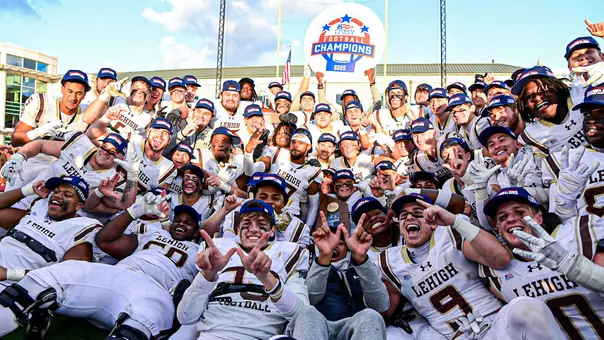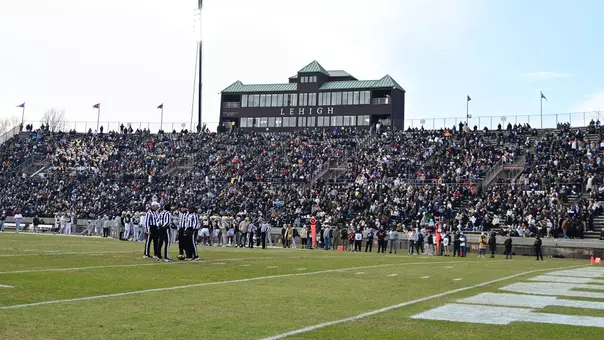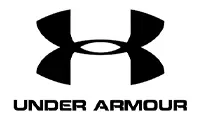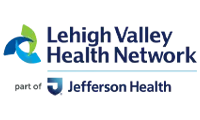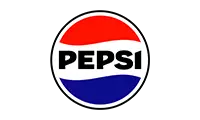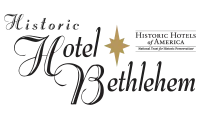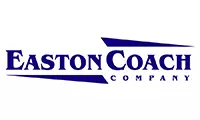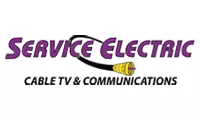Lehigh University Athletics
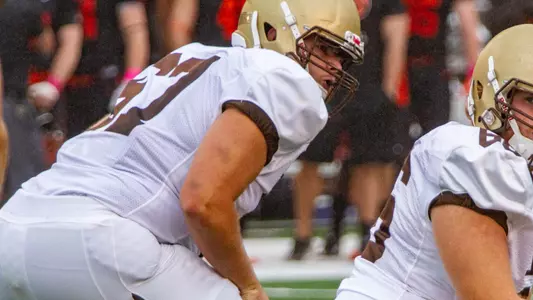
Photo by: Alec Turner/tfp.nyc
Using His Homefield Advantage: Jan Maciejewski
12/18/2020 9:00:00 AM | Football, Student Athlete, Features, Flight 45, Intellectual Development
By: Justin Lafleur, Lehigh Sports Communications
Junior offensive lineman Jan Maciejewski was extremely disappointed when the fall athletics season was cancelled due to the COVID-19 pandemic.
But Maciejewski remained motivated to seek out opportunities, which led him to the new Homefield Advantage program – offered to student-athletes by Lehigh Athletics in partnership with the Baker Institute for Entrepreneurship, Creativity and Innovation.
"I have a willingness to seek out success, regardless of the situation," he said. "At practice, we talk a lot about crossing the brown line. I feel like I do a good job of focusing on what's in front of me and attacking every day."
Maciejewski went on to say he lives by the motto "memento mori" – be mindful of death.
"I've had a lot of friends pass away early in life, and it's something that motivates me every day because that could have been me," he said. "Tomorrow is not guaranteed for anyone. How am I going to make the most of today?"
Maciejewski certainly made the most of an atypical semester by applying to Homefield Advantage (and then applying himself over the course of the program).
"With our season being taken away, it was a blessing in disguise," he said. "Without knowing what was coming in our future with athletics, I wanted to make the most of the here and now."
The goal for the 18 student-athletes in the eight-week program was to create ways for more people to experience the advantages of secure living conditions. The program ran from late September through November, ending with the final pitch competition between the three teams, which Maciejewski's group won.

"We focused on modern-day redlining," said the business information systems major. "Formerly redlined communities are not targeted anymore like they were, but the bullwhip effect from the past is still affecting them."
Redlining began in the 1930s as a way to "safeguard" home loan offerings for banks offering mortgages. It indicated that certain areas, marked in red on city maps, carried greater risk for payment due to their primarily Black populations.
"With redlined zones mapped out in red, individuals would not even be able to secure a housing loan or mortgage, and would usually be stuck in less favorable situations," said Maciejewski. "These snowballed into even more socioeconomic issues in the long term, as you might imagine."
The Fair Housing Act of 1968 banned redlining, but effects are still felt today.
"Formerly redlined communities are still often underfunded, whether that be tax based or a lack of opportunities," said Maciejewski "There aren't many opportunities for growth.
"It becomes this endless spiral."
Maciejewski and his team's idea to break the spiral was an app that connects businesses with municipal resources.
"The app is like a facilitator between communities and businesses," he said. "We want to help raise the tax base and improve the community from a business standpoint, while also taking into consideration community concerns and feedback. We're connecting incoming businesses with things like zoning ordinances and tax benefits."
When developing the app, the group focused specifically on Bethlehem, a city that offers a lot of benefits not many people know about.
"We're trying to help the current residents, and trying to get more people coming in to help improve these former redline communities…starting with Bethlehem, then hopefully be able to scale bigger," said Maciejewski.
The topic of redlining is especially meaningful today with heightened awareness on the fight for social justice and equity in the country.
"Once the group honed in on the fact that formerly redlined communities continued to be plagued by lack of infrastructure due to (among other things) a lower tax base, they began to identify specific areas in which they could focus," said Lisa Getzler, Executive Director for the Baker Institute. "They concurrently were learning the basics of an entrepreneurial approach to identifying a specific problem and creating a viable, valuable solution.

"In only eight weeks, the modern-day redlining team followed that process and came up with a solution using technology to invite and support business creation and relocation inside formerly redlined communities as a step towards ultimately increasing the tax base to improve infrastructure," Getzler continued. "Importantly, their solution also features safeguards to protect residents from the negative aspects of gentrification (when a poor urban area is changed by wealthier people moving in)."
Successfully working through the eight-week program, Maciejewski found himself using plenty of skills learned as an athlete. Like on the playing field, victories don't happen overnight.
There was a build-up to the final pitch competition, much like a build-up of practice and games during an athletics season.
"When you train today, you're not going to win a championship tomorrow," said Maciejewski. "You have to be process-oriented. You'll have good and bad days, but at the end of the day, you need to keep working and get a little bit better every day.
"Even making a small bit of change every day adds up."
Creating change as entrepreneurs isn't easy, either, and often includes adversity – much like an athletics season.
"Something that stuck out to me about the modern-day redlining group was their persistence," said Director of Athletics Leadership Development Julie Ammary. "They confronted some challenges along the way and responded very well to direct feedback. They adopted a growth mindset and used adversity as an opportunity to unite as a team, enabling them to compete even harder when it mattered most.
"They could have easily thrown in the towel, but persevered and it paid off."
It paid off with a "victory" in the final pitch competition.
Maciejewski credits a large part of his team's success to communication.
"Communication was our best friend in keeping us all on the same page," he said. "Initially, we had some bumps in the road because we weren't communicating well enough. So we had active dialogue and broke down that hierarchal barrier, because everyone's in it together."
Around halfway through the program, the team was at a crossroads.
"We just had to settle down because we knew we had something good going," said Maciejewski.
That good would translate into success. Communication helped them settle down, which is something Maciejewski needs to show on every play as an offensive lineman.
"Everything is pre-snap," he said. "We get the quarterback's play call then in two seconds, have to be ready with all our identifications and play calls. Obviously, if you're not on that same page before a snap is called, you're not going to get anywhere."

Offensive line can be a pretty thankless position, but is extremely important. In many ways, offensive linemen like Maciejewski represent the hard work successful teams put in that go unnoticed.
"Without all that back-end work and getting gritty in the trenches, the ball's not moving anywhere," he said. "Hard work is a good mindset to apply to anything."
Another mindset of Maciejewski is the reason he applied to Homefield Advantage in the first place… making the most of every day and every opportunity.
"This fall, our [football] team was bought-in hoping to practice and lift, but that was also taken away with case spikes," he said. "Despite that, you just have to work your butt off today as if tomorrow's not even going to come.
"If you give it your all every day, it's going to be hard for this world to bring you down."
That attitude will continue leading to opportunities, on and off the field. Speaking of opportunities, Maciejewski and the modern-day redlining group now have more potential opportunities in front of them due to the Homefield Advantage program.
"As first-place winners in the Homefield Advantage pitch competition, the modern-day redlining team was granted automatic acceptance into the EUREKA! program," said Getzler. "EUREKA! is designed to support students in the Idea to Launch continuum. From a napkin sketch through the launch of a startup, the Baker Institute provides mentorship and funding to help student entrepreneurs test entrepreneurial ideas and execute on the next steps."
There's also an opportunity for members of the modern-day redlining team to participate in the Hatchery, a full-time idea accelerator offered each summer by the Baker Institute.
"In this program, students dedicate a portion of their summer to deepening their understanding of entrepreneurship, put it into practice on their own ideas, and collaborate with like-minded students and alumni," said Getzler. "Guided by the Baker team and alumni mentors, they take the steps necessary to execute on their concepts."
EUREKA! and the Hatchery are opportunities stemming from the successful pilot of Homefield Advantage.
"Our students demonstrated tangible learning and growth," said Ammary. "Likewise, our staff learned so much, related to both content and process. We loved partnering with the Baker Institute and all feel very energized about future iterations of Homefield Advantage. We're collecting feedback from the student-athletes and have begun planning for our next cohort.
"This program and partnership is definitely a bright spot in what has been a challenging year."
The 2020 program is complete, but its impact may not be over just yet. Homefield Advantage's top focus was student-athlete learning, but a byproduct could be making real change within the community.
"I would love to see modern-day redlining continue with their project because it has the potential to make a difference in Bethlehem," said Ammary. "I want our student-athletes to believe they're powerful leaders capable of real change, especially as we work collectively to combat racism. The solution proposed by our modern-day redlining team would help erode some of the systemic barriers to equitable housing.
"That's real impact."

Junior offensive lineman Jan Maciejewski was extremely disappointed when the fall athletics season was cancelled due to the COVID-19 pandemic.
But Maciejewski remained motivated to seek out opportunities, which led him to the new Homefield Advantage program – offered to student-athletes by Lehigh Athletics in partnership with the Baker Institute for Entrepreneurship, Creativity and Innovation.
"I have a willingness to seek out success, regardless of the situation," he said. "At practice, we talk a lot about crossing the brown line. I feel like I do a good job of focusing on what's in front of me and attacking every day."
Maciejewski went on to say he lives by the motto "memento mori" – be mindful of death.
"I've had a lot of friends pass away early in life, and it's something that motivates me every day because that could have been me," he said. "Tomorrow is not guaranteed for anyone. How am I going to make the most of today?"
Maciejewski certainly made the most of an atypical semester by applying to Homefield Advantage (and then applying himself over the course of the program).
"With our season being taken away, it was a blessing in disguise," he said. "Without knowing what was coming in our future with athletics, I wanted to make the most of the here and now."
The goal for the 18 student-athletes in the eight-week program was to create ways for more people to experience the advantages of secure living conditions. The program ran from late September through November, ending with the final pitch competition between the three teams, which Maciejewski's group won.

"We focused on modern-day redlining," said the business information systems major. "Formerly redlined communities are not targeted anymore like they were, but the bullwhip effect from the past is still affecting them."
Redlining began in the 1930s as a way to "safeguard" home loan offerings for banks offering mortgages. It indicated that certain areas, marked in red on city maps, carried greater risk for payment due to their primarily Black populations.
"With redlined zones mapped out in red, individuals would not even be able to secure a housing loan or mortgage, and would usually be stuck in less favorable situations," said Maciejewski. "These snowballed into even more socioeconomic issues in the long term, as you might imagine."
The Fair Housing Act of 1968 banned redlining, but effects are still felt today.
"Formerly redlined communities are still often underfunded, whether that be tax based or a lack of opportunities," said Maciejewski "There aren't many opportunities for growth.
"It becomes this endless spiral."
Maciejewski and his team's idea to break the spiral was an app that connects businesses with municipal resources.
"The app is like a facilitator between communities and businesses," he said. "We want to help raise the tax base and improve the community from a business standpoint, while also taking into consideration community concerns and feedback. We're connecting incoming businesses with things like zoning ordinances and tax benefits."
When developing the app, the group focused specifically on Bethlehem, a city that offers a lot of benefits not many people know about.
"We're trying to help the current residents, and trying to get more people coming in to help improve these former redline communities…starting with Bethlehem, then hopefully be able to scale bigger," said Maciejewski.
The topic of redlining is especially meaningful today with heightened awareness on the fight for social justice and equity in the country.
"Once the group honed in on the fact that formerly redlined communities continued to be plagued by lack of infrastructure due to (among other things) a lower tax base, they began to identify specific areas in which they could focus," said Lisa Getzler, Executive Director for the Baker Institute. "They concurrently were learning the basics of an entrepreneurial approach to identifying a specific problem and creating a viable, valuable solution.

"In only eight weeks, the modern-day redlining team followed that process and came up with a solution using technology to invite and support business creation and relocation inside formerly redlined communities as a step towards ultimately increasing the tax base to improve infrastructure," Getzler continued. "Importantly, their solution also features safeguards to protect residents from the negative aspects of gentrification (when a poor urban area is changed by wealthier people moving in)."
Successfully working through the eight-week program, Maciejewski found himself using plenty of skills learned as an athlete. Like on the playing field, victories don't happen overnight.
There was a build-up to the final pitch competition, much like a build-up of practice and games during an athletics season.
"When you train today, you're not going to win a championship tomorrow," said Maciejewski. "You have to be process-oriented. You'll have good and bad days, but at the end of the day, you need to keep working and get a little bit better every day.
"Even making a small bit of change every day adds up."
Creating change as entrepreneurs isn't easy, either, and often includes adversity – much like an athletics season.
"Something that stuck out to me about the modern-day redlining group was their persistence," said Director of Athletics Leadership Development Julie Ammary. "They confronted some challenges along the way and responded very well to direct feedback. They adopted a growth mindset and used adversity as an opportunity to unite as a team, enabling them to compete even harder when it mattered most.
"They could have easily thrown in the towel, but persevered and it paid off."
It paid off with a "victory" in the final pitch competition.
Maciejewski credits a large part of his team's success to communication.
"Communication was our best friend in keeping us all on the same page," he said. "Initially, we had some bumps in the road because we weren't communicating well enough. So we had active dialogue and broke down that hierarchal barrier, because everyone's in it together."
Around halfway through the program, the team was at a crossroads.
"We just had to settle down because we knew we had something good going," said Maciejewski.
That good would translate into success. Communication helped them settle down, which is something Maciejewski needs to show on every play as an offensive lineman.
"Everything is pre-snap," he said. "We get the quarterback's play call then in two seconds, have to be ready with all our identifications and play calls. Obviously, if you're not on that same page before a snap is called, you're not going to get anywhere."

Offensive line can be a pretty thankless position, but is extremely important. In many ways, offensive linemen like Maciejewski represent the hard work successful teams put in that go unnoticed.
"Without all that back-end work and getting gritty in the trenches, the ball's not moving anywhere," he said. "Hard work is a good mindset to apply to anything."
Another mindset of Maciejewski is the reason he applied to Homefield Advantage in the first place… making the most of every day and every opportunity.
"This fall, our [football] team was bought-in hoping to practice and lift, but that was also taken away with case spikes," he said. "Despite that, you just have to work your butt off today as if tomorrow's not even going to come.
"If you give it your all every day, it's going to be hard for this world to bring you down."
That attitude will continue leading to opportunities, on and off the field. Speaking of opportunities, Maciejewski and the modern-day redlining group now have more potential opportunities in front of them due to the Homefield Advantage program.
"As first-place winners in the Homefield Advantage pitch competition, the modern-day redlining team was granted automatic acceptance into the EUREKA! program," said Getzler. "EUREKA! is designed to support students in the Idea to Launch continuum. From a napkin sketch through the launch of a startup, the Baker Institute provides mentorship and funding to help student entrepreneurs test entrepreneurial ideas and execute on the next steps."
There's also an opportunity for members of the modern-day redlining team to participate in the Hatchery, a full-time idea accelerator offered each summer by the Baker Institute.
"In this program, students dedicate a portion of their summer to deepening their understanding of entrepreneurship, put it into practice on their own ideas, and collaborate with like-minded students and alumni," said Getzler. "Guided by the Baker team and alumni mentors, they take the steps necessary to execute on their concepts."
EUREKA! and the Hatchery are opportunities stemming from the successful pilot of Homefield Advantage.
"Our students demonstrated tangible learning and growth," said Ammary. "Likewise, our staff learned so much, related to both content and process. We loved partnering with the Baker Institute and all feel very energized about future iterations of Homefield Advantage. We're collecting feedback from the student-athletes and have begun planning for our next cohort.
"This program and partnership is definitely a bright spot in what has been a challenging year."
The 2020 program is complete, but its impact may not be over just yet. Homefield Advantage's top focus was student-athlete learning, but a byproduct could be making real change within the community.
"I would love to see modern-day redlining continue with their project because it has the potential to make a difference in Bethlehem," said Ammary. "I want our student-athletes to believe they're powerful leaders capable of real change, especially as we work collectively to combat racism. The solution proposed by our modern-day redlining team would help erode some of the systemic barriers to equitable housing.
"That's real impact."

Players Mentioned
Lehigh Sports Central: Football
Tuesday, December 02
MHT EP6 - Football
Thursday, November 20
Brown & Flight - Episode 4
Friday, November 14
Football Blitz
Friday, October 31

